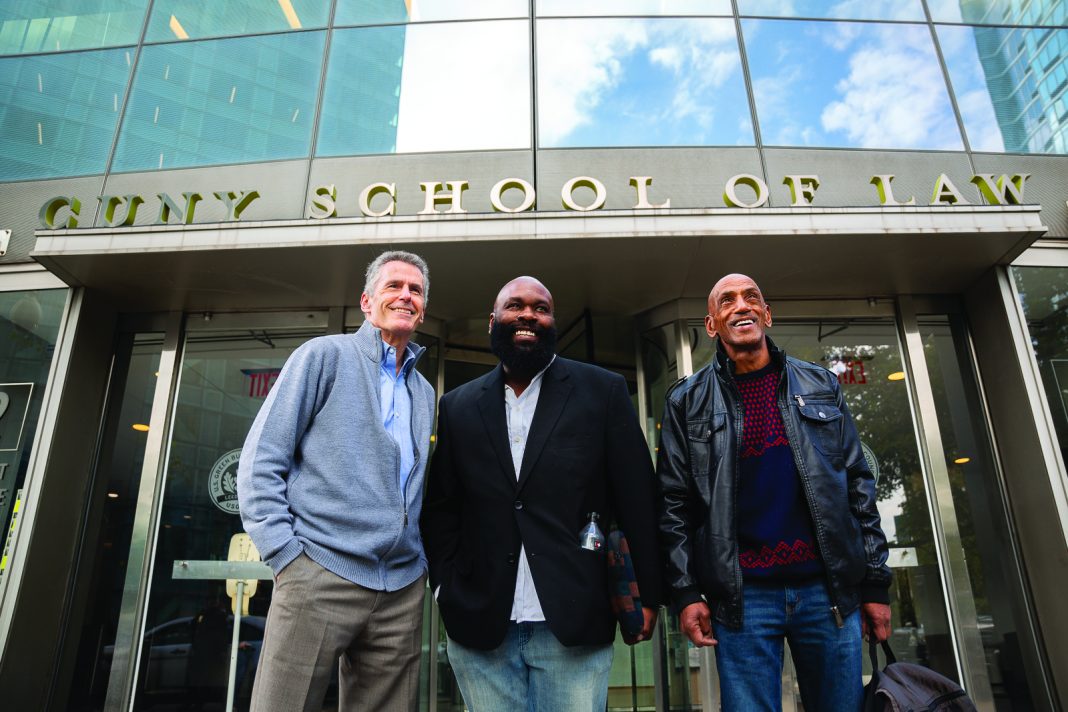For Noa Street-Sachs, the journey to public service law began in an unexpected classroom: a maximum-security prison.
As an undergrad, she served as a teaching assistant working with incarcerated individuals, many of whom had been behind bars for longer than she’d been alive.
“It made me want to pursue a career in public interest, specifically advocating for people enmeshed in the criminal legal system,” she said.
But law school wasn’t the obvious next step. After college, Street-Sachs spent two years investigating police misconduct.
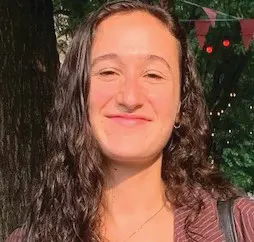
“I was really grappling with the law and working alongside lawyers … speaking to people, majority from marginalized communities, who had experienced police harm,” she said. “That really confirmed for me that I wanted to be an advocate; I wanted to be a defense attorney.”
That clarity brought her to City University of New York School of Law, where she found a program that aligned with her values.
“CUNY Law stood out to me for its mission of radical lawyering … not just learning the law but figuring out how to challenge it, how to engage with it, how to use it to help people,” she said.
Public service lawyering
To view the full ranking of the 2025 Best Law Schools for Public Service, click here.
If you’re drawn to justice, equity or community impact, public service law may be the path you’re looking for, even if you don’t know exactly what it means yet.
At its core, public service in the legal profession is about using your legal skills to serve the greater good. That can look like representing low-income clients who can’t afford legal counsel, working in government to help develop fair policy or advocating for civil rights.
Public service lawyers work in many different environments: legal aid organizations, nonprofits, advocacy groups, government agencies and even the judiciary. Their roles vary, but they’re united by a common thread: a commitment to advancing justice for individuals and communities who are often underserved or marginalized.
As a prelaw student, exploring public service means learning how lawyers can be changemakers in courtrooms, schools, housing offices, legislatures and beyond. It’s a way to align your values with your future career, and it starts by asking: Who do I want to serve? What injustices do I want to help fix?
Getting on the right legal path starts with attending the law school that most aligns with your interest in public service work.
Public interest pathways
For Street-Sachs, CUNY Law’s emphasis on public interest is what she was seeking, and the school fit the bill.
CUNY Law earns the top spot in our ranking for Best School for Public Interest with Northeastern University School of Law at No. 2 and University of California Davis School of Law at No. 3.
Charisa Smith, professor at CUNY Law, co-directs the Family Law Practice Clinic. She said public interest law is more than a specialty; it’s a mindset.
“Public service isn’t just about nonprofit jobs or courtroom advocacy,” she said. “It’s about seeing law as a tool to serve people.”
For prelaw students considering a career in public service, Smith’s message is clear: Your background, your challenges and your commitment to justice are assets.
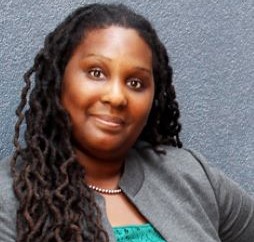
“For aspiring lawyers from underrepresented backgrounds, this means law school isn’t just about fitting into the profession — it’s about reshaping it,” she said.
As a first-generation attorney who struggled with the LSAT despite excelling academically at Harvard, Smith understands those barriers firsthand. But she encourages students not to be deterred.
“Cast aside self-doubt,” she said. “There are pathways for you.”
From the first year, students at CUNY Law are immersed in real-world scenarios through a lawyering seminar focused on trauma-informed advocacy, client-centered lawyering and understanding narrative. By the third year, every student is required to participate in a clinic, working directly with clients in areas such as immigration, housing and youth justice.
“We have the No. 1 record for public interest graduates,” Smith said. “And they graduate with practice readiness.”
If you’re a prelaw student curious about public service but unsure how to begin, Smith said to do informational interviews with attorneys working in the areas that are of interest, volunteer with an advocacy organization and know that you belong no matter your background.
“Your understanding of what it means to lack something — power, access, opportunity — that’s not a weakness,” she said. “That’s what the profession needs right now.”
Smith’s message to future law students is inspiring: The law can be reclaimed and reimagined.
“Don’t wait to be invited,” she said. “Now more than ever, you are meant for this.”
Passionate about justice
At Northeastern Law, the public interest path is woven into the school’s DNA.
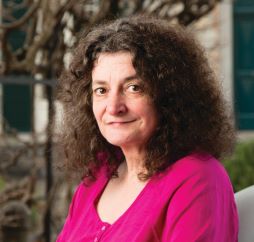
Professor Lucy Williams and Renay Frankel are two champions of public interest at Northeastern Law. Williams, a veteran public interest attorney, now serves as faculty director of the school’s Center for Public Interest Advocacy and Collaboration. Frankel, a Northeastern Law alumna, is the center’s managing director.
“Students are coming here specifically to learn how to use the law to fight racism, sexism, homophobia, economic inequality,” Williams said. “These students don’t just want a job; they want meaning. They want to transform the world, even in some small way.”
Frankel said students typically choose public interest law because they’re passionate about justice.
“They see the law as a tool to create individual and systemic change and that passion translates into a readiness to work alongside marginalized communities, not just on behalf of them,” Frankel said.
Williams said what sets Northeastern Law apart in preparing students for public interest work is its signature co-op program.
“After their first year of academic study, students alternate semesters between coursework and full-time legal internships, with three in total,” Williams said. “Students have nearly a full year of legal practice even before they’ve passed the bar.”
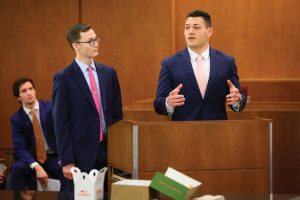
In addition to co-ops, students participate in law school clinics that allow them to work on immigration cases, housing disputes, community business matters and more, all under professor supervision.
For prelaw students weighing their options, public interest law offers more than a career; it offers purpose.
“At Northeastern Law, that purpose is backed by real-world experience, strong mentorship and a deep commitment to justice,” Frankel said. “If you believe that law can be a force for good, this path is not only viable, it’s vital. Today more than ever we need lawyers with heart.”
Government careers
Within the broad umbrella of public service, diverse career paths are available in government.
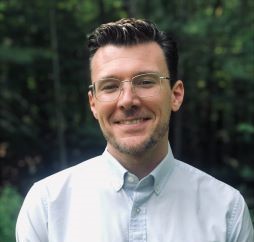
Patrick Wildes, director of the Government Law Center at Albany Law School and a 2016 grad of the school, said prelaw students can start preparing now for a career in government law.
“Not all public service legal careers are the same; public service is the umbrella,” Wildes said. “Underneath that, you have public interest work such as legal aid, community legal assistance and public defenders, and then you have government work, which includes local, state and federal jobs, as well as prosecutorial roles.”
As the only law school located in New York State’s capital, Albany Law School benefits from unmatched proximity to state government institutions, including the governor’s office, legislature, courts and key agencies. We rank the law school No. 1 for Best School in Government.
“We’re an hour and a half away from any other law school,” he said. “That creates tremendous opportunity for direct student involvement in government throughout their time here.”
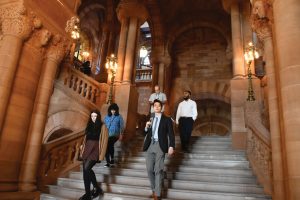
That opportunity translates into tangible outcomes: 53% of Albany Law’s Class of 2024 entered public service, with 29% in government roles, 18% in public interest positions and 6% clerking for judges. “We believe we have one of the highest government placement rates in the country,” Wildes said.
Albany Law helps students explore paths through programs like the Government Law Center Fellowship. Fellows receive mentorship from experienced government professionals, attend biweekly career talks, complete public service internships, and take targeted courses designed to prepare them for government work.
“We want to prepare the next generation of government lawyers and leaders,” Wildes said.
Despite headlines suggesting otherwise, Wildes said that government jobs, particularly at the state and local levels, remain in demand.
“There’s still plenty of work to be done,” he said. “We haven’t seen a slowdown. If anything, many agencies are in desperate need of attorneys.”
For students who want to make a difference through the law, a future in government might be the right fit. And for those just starting out, understanding the field and getting early exposure can make all the difference.
“Ultimately, a lot of students are drawn to law school because they want to help people,” Wildes said. “Even if they don’t know the exact job title yet, they know that public service offers a way to do that.”
Criminal roles
Public service also branches into criminal law, with public defenders and prosecutors.
We rank University of the District of Columbia David A. Clarke School of Law at No. 1, Brooklyn Law School at No. 2 and Case Western Reserve University School of Law at No. 3 for criminal law.
For Ranjana Venkatesh, a May 2025 CUNY Law graduate, public service has always been part of her identity.
“I grew up as an activist,” Venkatesh said.
Her commitment to housing justice and anti-gentrification work in New York eventually brought her into close contact with public interest lawyers. Watching an attorney provide free legal support to tenants facing eviction was the moment that changed everything.

“That was the lightbulb moment,” she said. “I knew I wanted to use legal tools for the public good. I wasn’t interested in chasing prestige; I wanted to make a difference.”
Venkatesh encourages prospective students to think of the law as a means to an end.
“If you care about changing the world — about housing, criminal justice, immigration — ask yourself how law fits into that,” she said. “It’s not about status. It’s about what you do with it.”
Venkatesh’s time in CUNY’s Defenders Clinic, working alongside clients seeking parole and clemency, showed her the emotional depth of public defense.
“You’re building relationships with people impacted by systemic injustice,” she said. “It’s intense, but it’s also where real connection and change happen.”
Street-Sachs also spent time in CUNY Law’s Defenders Clinic. She graduated this past spring and looks forward to working with The Legal Aid Society’s Criminal Defense Practice in New York City.
“It was a full-circle moment,” said Street-Sachs, reflecting on how the clinic mirrored the work that initially inspired her. “We were pursuing clemency and parole, and our professors taught us scrappy, creative lawyering, emphasizing the importance of writing a motion that hasn’t been written yet and of exploring any avenues we could to help clients. Two senior advisers who were formerly incarcerated also provided us with guidance.”
For those interested in public service lawyering, Street-Sachs offers this advice: don’t feel rushed; take your time to map a path.
“Working a little before law school gave me clarity,” she said. “And if you know you’re interested in public interest, look for a law school where that’s built into the program from day one.”
The Judicial Clerkship Path
One path worth understanding early is the judicial clerkship.
Lois Casaleggi, associate dean for career services at The University of Chicago Law School, said clerking is one of the most formative experiences for a young lawyer.
“Clerking means working directly for a judge to help them do their job, which includes researching legal issues, analyzing arguments and drafting memoranda and opinions,” Casaleggi said.
Most clerkships are with individual judges, and clerks become part of the judge’s “chambers,” a small, tight-knit team that supports the judge’s work.
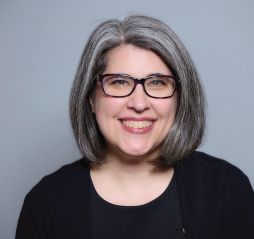
For students just starting to explore law as a career, clerkships may seem like a distant goal. But Casaleggi encourages prelaw students to be curious about the judicial system now.
“Read articles about how courts operate. Attend public court hearings. Follow legal news,” she said. “These small steps help build an understanding of how judges think and why clerkships matter.”
Casaleggi said a clerkship is like a fast-track course in becoming a great lawyer.
“This behind-the-scenes view helps future lawyers develop their own advocacy style and build confidence,” she said. “It’s a high-stakes environment, and future employers recognize the value of that experience.”

